
Vet Med Faces of Research: Dr. Lara Sypniewski
Wednesday, October 6, 2021
Dr. Lara Sypniewski is the Henthorne Clinical Professor of Small Animal Medicine at Oklahoma State University’s College of Veterinary Medicine. Her current research focuses on how food impacts the lifetime of a dog’s health.
“Basically we’re looking to see if food’s ingredients or its processing has on impact on the canine microbiome or on inflammation in the gut,” Sypniewski said. “We want to know if it changes the risk of disease for dogs that are eating certain foods and if they are clinically healthier when they are on different diets.
“I’m a firm believer that you are what you eat. When you look at what we do for ourselves to stay healthy, we preach so much about a healthy diet, farm to table food and try to avoid processed foods and we’re just not in that same position in the canine and feline world. I think it’s really exciting to have the opportunity to look at whether processing and/or particular ingredients actually improve the overall wellbeing of a dog and potentially decrease the incidence of disease and increase their longevity.
“We, as veterinarians, get a lot of questions on what food should I feed my dog. There are so many different food options and different companies. When it comes to my patients, the most important thing I tell people for the life of their pet is to keep them trim. This is something you can do to help your dog live a long, healthy life. If my research has the opportunity to say this type of processing or this type of food ingredient or this particular additive or supplement can reduce inflammation and can improve the health of the microbiome and then ultimately keep your dog healthy, that just makes me excited. I care about my patients living long, healthy and quality lives so they can provide all the happiness and joy for their people.
“I think the most important thing that people know about research is unfortunately, research takes time. We start with great ideas. Those great ideas have to be explored and evaluated as to how you apply those great ideas. And then the research has to take place and then you have to get results. It just takes a lot of time to get from a great idea to an answer. Often times we run into many speed bumps or road blocks where we have a great idea, but we can’t get a good answer and that can be very frustrating for lay people. You have to be patient. Even if you have the most amazing idea, the greatest people and the funding that you need, it still takes time and patience and I believe, quite a bit of fortitude to stick with it. When you’re researching food and looking at changing something we have done the same way for the past 50 years, you may encounter some pushback or resistance. People don’t like change. I think it is important to evaluate what we are doing and say, is this truly the best way to do it? Is there a way that we can take what we know and improve upon it?
“As a clinical scientist, I would say success looks like being able to look back on the whole life of a patient and say that we really did a great job, making good recommendations and being impactful in a positive way for both the patient and the client. That’s what really matters to me.”
Vet Med Faces of Research is a monthly series designed to inform the public about the impact of the numerous studies being conducted at Oklahoma State University’s College of Veterinary Medicine. Advancing knowledge and understanding for the benefit of the lives and livelihoods of the people of Oklahoma is a critical element of OSU’s land-grant mission. If you would like to support research at the college, please contact Ashley Hesser, director of development with the OSU Foundation, at 405-385-0715 or ahesser@osugiving.com.
